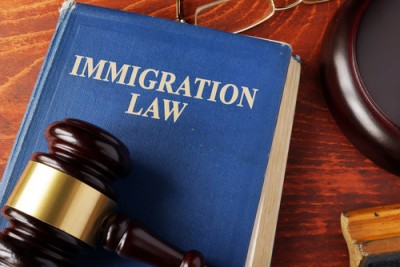Student interest in immigration law rises with recent political developments

Law student Karina Guzman recalls the palpable fear among noncitizen clients of the Cameron Law Offices—a Boston immigration firm where she interned last fall—in the aftermath of President Donald Trump’s election.
Trump had made immigration a signature issue of his presidential campaign, calling for sweeping measures that included deportation of the more than 11 million undocumented immigrants in the United States and construction of a wall across its entire southern border.
“I was getting many calls from clients asking: ‘What am I going to do next? What does this mean? I’m very scared,’ ” says Guzman, a third-year student at the Northeastern University School of Law.
For her, it was an early sign of the tumult to erupt after Trump took office. In his first few weeks as president, Trump issued an executive order that banned travel from seven Muslim-majority countries to the United States and suspended the U.S. refugee program for 120 days.
The legal and political furor set off by the travel ban and related orders has had a profound impact on U.S. law schools and students such as Guzman. Interest in immigration law is surging, and schools are ramping up programs and staffing to meet soaring demand from students and immigrants.
NEW WAVE OF SPECIALISTS
In the long term, the trend also could birth a new wave of immigration law specialists. “One of the silver linings of this administration’s policy for immigrants is it’s recruiting a generation of advocates,” says Maureen Sweeney, an immigration law instructor at the University of Maryland Francis King Carey School of Law.
Evidence that immigration law has gained a new cachet on campuses isn’t hard to find. At the Fordham University School of Law, for example, enrollment for the introductory immigration law course this fall more than tripled to 90 students from last year.
“We had to move to a larger room,” says Jennifer Gordon, a professor who teaches the class at Fordham. “Student demand jumped enormously.”
Similarly, Sweeney says her immigration law class has doubled in size to more than 50 students. Further, 9 percent of incoming students chose immigration as one of their top two law specialty preferences, an increase from 4 percent in 2014.
Katrin Hussmann Schroll, the University of Maryland law school’s assistant dean for admissions, says many applicants cited in their essays the legal fight ignited by the Trump immigration policies as a reason they wanted to attend law school.
Getting a better grasp of immigration law at a time when such issues are making headlines is driving interest at a basic level. “But the major motivation for students is to learn something that they can translate into helping immigrants and refugees who are affected by the president’s executive orders and policies,” says Gordon, an expert on immigration and labor law.
That eagerness to get involved surfaced immediately after Trump signed executive orders on immigration and security policy after his inauguration in January. Law school students nationwide packed town hall-style meetings and forums to grapple with the implications of the new restrictions.
The law school community also was on the front lines assisting travelers from affected countries at U.S. airports when the travel ban was imposed. Those efforts included providing free legal counsel, monitoring the actions of customs officials, and demonstrating against the ban.
“That Friday [when the travel ban took effect], my phone was just blowing up with emails and texts from lawyers throughout the U.S. who were going to airports to assist people who were trying to get in and being blocked,” says Holly Cooper, co-director of the Immigration Law Clinic at the University of California at Davis School of Law.
In the ensuing days, the clinic would help identify people threatened with deportation, prepare emergency motions, and aid in negotiations with customs officials.
“That’s where the clinic’s skills in federal litigation were really helpful,” says Cooper, noting that UC Davis has one of the few immigration law clinics in the country that handles deportation cases in federal court.
The 20 students in the clinic also can get experience arguing cases before the 9th U.S. Circuit Court of Appeals at San Francisco. Several assisted in a high-profile case in which the 9th Circuit ruled in July that undocumented immigrant children detained by federal authorities have the right to a hearing to determine whether they should remain confined.
This article appeared in the November 2017 issue of the ABA Journal with the headline “Immigrant Class: Student interest in immigration law rises with recent political developments."
Write a letter to the editor, share a story tip or update, or report an error.


